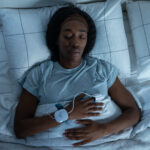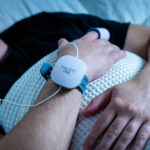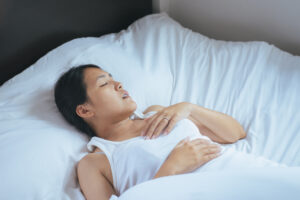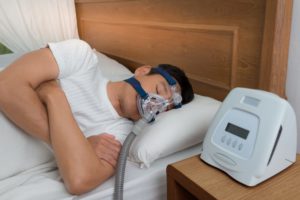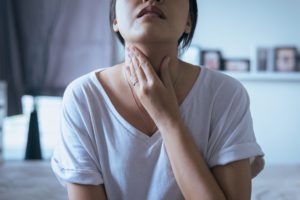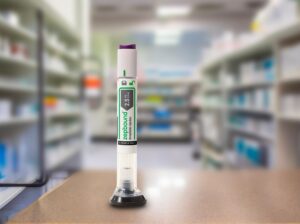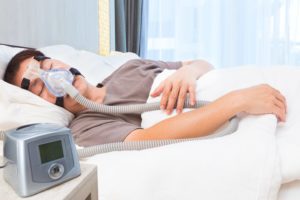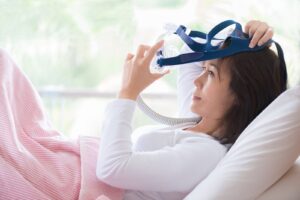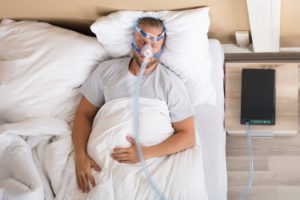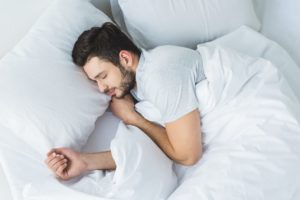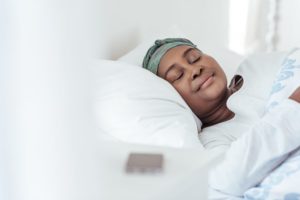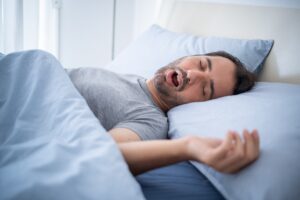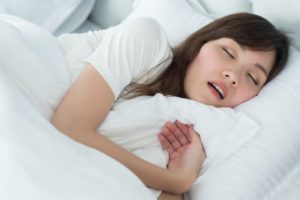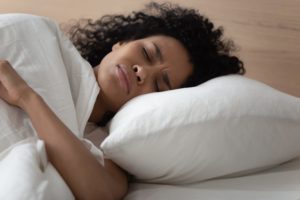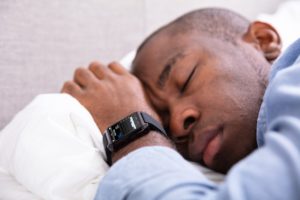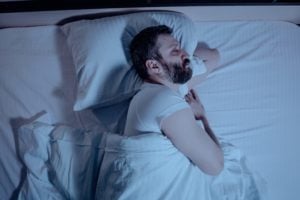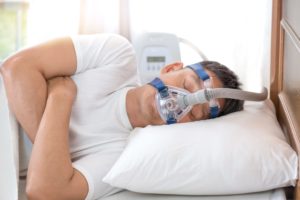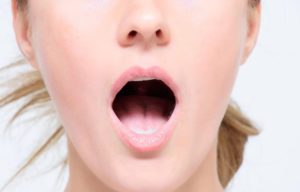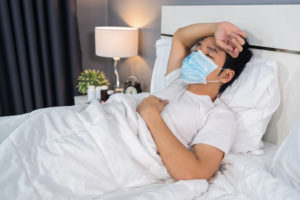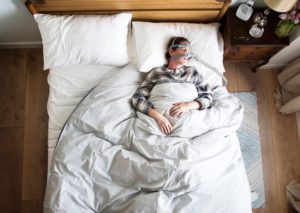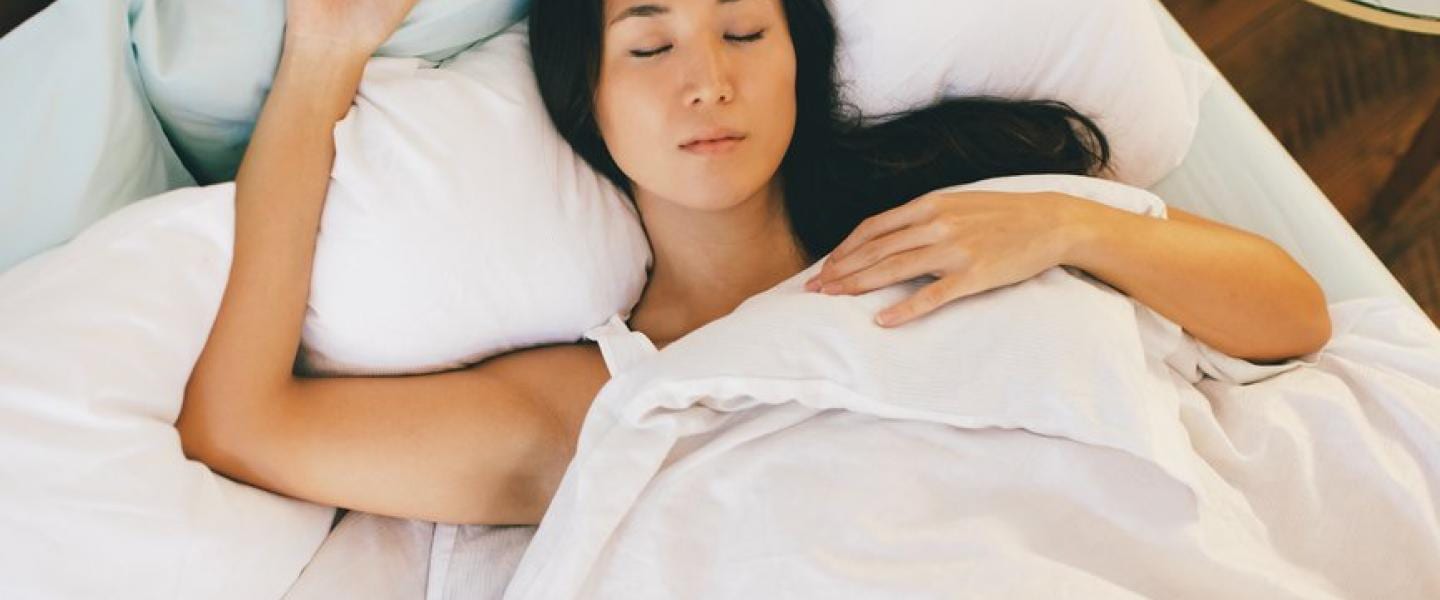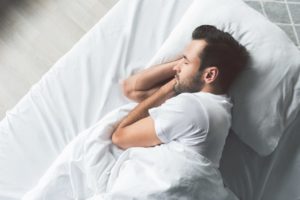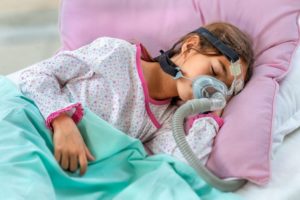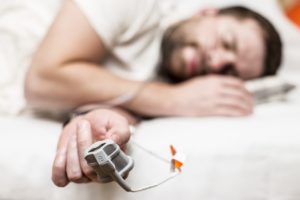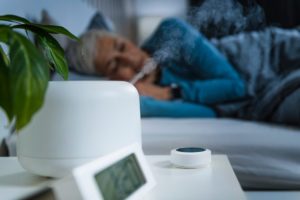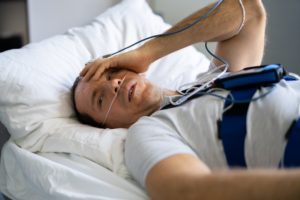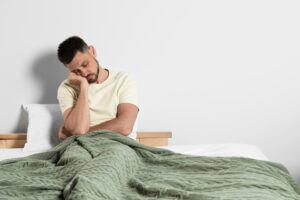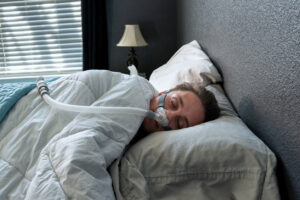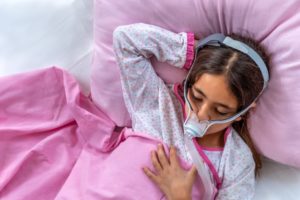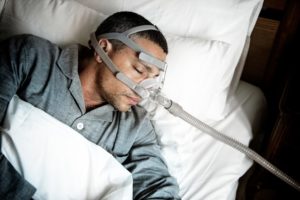When you buy through our links, we may earn a commission. Products or services may be offered by an affiliated entity. Learn more.
Sleep Apnea Headaches
Around 5% of people wake up with a morning headache. Headaches can be caused by a variety of factors, from alcohol to stress. Researchers have also documented a link between morning headaches and obstructive sleep apnea, a sleep-related breathing disorder. Learn more about what may cause sleep apnea headaches and how to find relief.
What Is a Sleep Apnea Headache?
Sleep apnea headaches are a recurring headache that some people with obstructive sleep apnea (OSA) experience upon waking up, at least 15 days per month. They are characterized by a pressing, not pulsing, pain that is usually felt across both sides of the head, and can last up to four hours. Unlike some other types of headaches, sleep apnea headaches are not accompanied by nausea or sensitivity to light and sound.
Estimates vary, but researchers believe up to 18% of people with OSA have sleep apnea headaches. OSA is a sleep-related breathing disorder that causes multiple temporary pauses in breathing throughout the night. These pauses can occur due to either a partial (hypopnea) or complete (apnea) obstruction of the person’s airway. The severity of a person’s OSA is rated according to the apnea-hypopnea index (AHI), which calculates how many respiratory events they experience per hour each night.
To be diagnosed as a sleep apnea headache, a person must have a diagnosis of OSA with an AHI of 5 or higher. Otherwise, what they are experiencing is a morning headache, which has similar symptoms. People with OSA may be up to three times more likely to experience morning headaches.
Waking Up With Headaches? Find Out If It’s Sleep Apnea
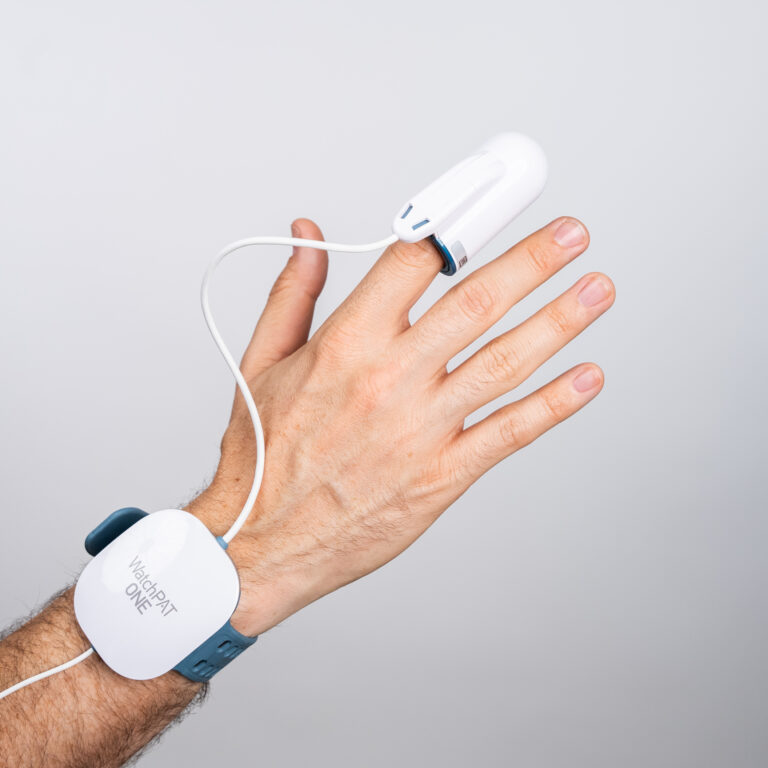
our partner at sleepdoctor.com
Save 54% on Your Home Sleep Test
Shop Now“Truly grateful for this home sleep test. Fair pricing and improved my sleep!”
Dawn G. – Verified Tester
Risk Factors for Sleep Apnea Headaches
Risk factors for sleep apnea headaches include being female and having a history of headaches. Currently, researchers disagree on whether OSA severity is related to sleep apnea headaches.
Some researchers have found that sleep apnea headaches are significantly more common among people with moderate and severe obstructive sleep apnea, while others have found that having more severe OSA only marginally increases your likelihood of sleep apnea headaches. The International Classification of Headache Disorders acknowledges that sleep apnea headaches may worsen or improve in tandem with OSA severity, but more than one study has found that the severity of OSA does not affect your likelihood of experiencing sleep apnea headaches.
Other Types of Headaches Associated With Obstructive Sleep Apnea
Obstructive sleep apnea is associated with sleep apnea headaches, cluster headaches, and hypnic headaches.
Cluster Headaches
Cluster headaches are associated with sleep apnea symptoms, but cluster headaches are distinct from sleep apnea headaches. Cluster headaches tend to occur during sleep, whereas sleep apnea headaches occur upon waking up. Also, unlike sleep apnea headaches, cluster headaches often include additional symptoms like a runny or stuffy nose, tearing up of the eyes, sweating on your forehead or face, and puffy or droopy eyes.
Cluster headaches often occur in clusters. For example, you may experience a few headaches a day, always around the same time, for a period of a few months. Then, you may not have any until the following year. Cluster headaches last around an hour on average.
Hypnic Headaches
Hypnic headaches, which also occur at night, are another sleep-related headache that may affect people with obstructive sleep apnea.
Hypnic headaches are more common among older people. While sleep apnea headaches begin after you wake up, hypnic headaches generally begin about four to six hours after falling asleep and often cause a person to wake up, which is why they have earned the nickname of alarm clock headaches.
Like sleep apnea headaches, hypnic headaches usually go away on their own within 30 minutes to an hour, but they have additional symptoms like nausea, which is not the case with sleep apnea headaches.
Migraines
Sleep apnea headaches are different from migraines. Migraines tend to last much longer, between four hours to three days, while a sleep apnea headache usually goes away on its own within a few hours of waking up. You may feel a sleep apnea headache on both sides of your head, while a migraine is typically localized to one side.
Also, migraines can occur any time of day or night, including during sleep, while sleep apnea headaches occur upon waking up. Unlike sleep apnea headaches, migraines typically have other symptoms, such as nausea or sensitivity to light and sound.
What Causes Sleep Apnea Headaches?
Researchers do not know for sure what causes sleep apnea headaches. They may be related to low blood oxygen levels during sleep or the sleep disturbances caused by lapses in breathing.
Some researchers have proposed that sleep apnea headaches might be associated with hypoxemia, which is when the oxygen levels in your blood fall below normal levels. The lapses in breathing that characterize sleep apnea can cause lower blood oxygen levels during sleep. This allows less oxygen to reach the brain and causes carbon dioxide to accumulate in the bloodstream, whereby blood vessels in the brain expand. As the pressure from that expansion builds up, it may develop into a sleep apnea headache and cause pain.
However, subsequent research has found that people with OSA who experience sleep apnea headaches have similar oxygen levels and experience more or less the same number of lapses in breathing compared to people with OSA who do not have sleep apnea headaches. So, while hypoxemia may contribute to some morning headaches, there must be another cause for sleep apnea headaches.
The breathing disruptions caused by OSA interrupt a person’s sleep, which can increase a person’s risk of hypertension and cardiovascular disease in the long term. These sleep disruptions may also play a role in whether you wake up with a morning headache.
For example, one study found that only certain OSA symptoms were associated with a higher chance of morning headaches. These included choking sensations during sleep, having a history of hypertension, and waking up unrefreshed from sleep. The researchers concluded that perhaps sleep apnea headaches are a symptom of poor sleep, which happens to be common in people with OSA.
Is Your Morning Headache Caused by Sleep Apnea?
Morning headaches can be a symptom of undiagnosed sleep apnea. If you or your sleep partner notice any of the following symptoms of obstructive sleep apnea, speak to your doctor:
- Loud snoring, gasping, or choking sounds during sleep
- Waking up due to gasping or choking
- Feeling that your sleep is unrefreshing
- Daytime symptoms like excessive sleepiness or lower energy
It is also possible to experience morning headaches without OSA. Morning headaches and headaches in general are also associated with other health conditions, including:
- Anxiety
- Depression
- Hypertension
- Sleep problems
- Tightness in the head, neck, jaw, or shoulders
- Side effect of medication
- Sleep bruxism, or teeth grinding
- Stress
Treatment Options for Sleep Apnea Headaches
If you are waking up with a headache every morning, set up an appointment with your doctor. They can ask you questions about your symptoms and carry out tests to determine whether your morning headaches are caused by obstructive sleep apnea or something else.
Sleep apnea headaches tend to disappear once you are successfully treated for OSA. Common treatments for OSA include continuous positive airway pressure (CPAP) therapy, oral appliances, lifestyle changes, and surgery.
CPAP Therapy
With continuous positive airway pressure (CPAP) therapy, you wear a mask over your face or nose during sleep. The mask is connected to a machine that delivers air pressure directly into your airways, keeping them open and preventing pauses in breathing. CPAP therapy is considered the most effective treatment for managing symptoms of OSA and improving quality of life.
When used as recommended, research shows CPAP therapy can reduce the number of lapses in breathing to less than five per hour.
Oral Appliance
Usually custom-fitted by a dentist, oral appliances are recommended for mild to moderate cases of OSA. These are typically designed to clear up your airways by moving your jaw forward and keeping your tongue in place. You wear them at night while you sleep.
Lifestyle Changes
Other factors may contribute to OSA, such as drinking alcohol or sleeping on your back, which can relax your throat muscles and cause the airway to narrow. Your doctor may recommend avoiding alcohol and sedatives before bedtime, and switching to sleeping on your side or stomach.
Your doctor may also recommend an exercise and diet program. For overweight or obese people with OSA, losing weight can help relieve symptoms.
Surgery
Surgeries like a tonsillectomy or a uvulopalatopharyngoplasty (which widens the airway by removing extra tissue) may be recommended in cases where other, less invasive treatments did not work.
Whether your morning headache is caused by OSA or another condition, it is worth talking to your doctor so you can feel less pain and have an easier time starting your day.

Still have questions? Ask our community!
Join our Sleep Care Community — a trusted hub of sleep health professionals, product specialists, and people just like you. Whether you need expert sleep advice for your insomnia or you’re searching for the perfect mattress, we’ve got you covered. Get personalized guidance from the experts who know sleep best.
References
11 Sources
-
Russell, M. B. (2013). Sleep apnea headache: A growing concern in an increasingly obese population? Expert Review of Neurotherapeutics, 13(10), 1129–1133.
https://pubmed.ncbi.nlm.nih.gov/24117275/ -
International Headache Society (2018). Sleep apnoea headache. The International Classification of Headache Disorders – ICHD-3.
https://ichd-3.org/10-headache-attributed-to-disorder-of-homoeostasis/10-1-headache-attributed-to-hypoxia-andor-hypercapnia/10-1-4-sleep-apnoea-headache/ -
Russell, M. B., Kristiansen, H. A., & Kværner, K. J. (2014). Headache in sleep apnea syndrome: Epidemiology and pathophysiology. Cephalalgia: An International Journal of Headache, 34(10), 752–755.
https://pubmed.ncbi.nlm.nih.gov/24928423/ -
American Academy of Sleep Medicine. (2014). The International Classification of Sleep Disorders – Third Edition (ICSD-3). Darien, IL. Ibrahim, W., Zafar, N., & Sharma, S. (2020). Myoclonus. StatPearls Publishing.
https://aasm.org/ -
Spałka, J., Kędzia, K., Kuczyński, W., Kudrycka, A., Małolepsza, A., Białasiewicz, P., & Mokros, Ł. (2020). Morning headache as an obstructive sleep apnea-related symptom among sleep clinic patients-a cross-section analysis. Brain Sciences, 10(1), 57.
https://pubmed.ncbi.nlm.nih.gov/31963788/ -
Goksan, B., Gunduz, A., Karadeniz, D., Ağan, K., Tascilar, F. N., Tan, F., Purisa, S., & Kaynak, H. (2009). Morning headache in sleep apnoea: Clinical and polysomnographic evaluation and response to nasal continuous positive airway pressure. Cephalalgia: An International Journal of Headache, 29(6), 635–641.
https://pubmed.ncbi.nlm.nih.gov/19187338/ -
Suzuki, K., Miyamoto, M., Miyamoto, T., Numao, A., Suzuki, S., Sakuta, H., Iwasaki, A., Watanabe, Y., Fujita, H., & Hirata, K. (2015). Sleep apnoea headache in obstructive sleep apnoea syndrome patients presenting with morning headache: Comparison of the ICHD-2 and ICHD-3 beta criteria. The Journal of Headache and Pain, 16, 56.
https://pubmed.ncbi.nlm.nih.gov/26103955/ -
Singh, N. N., & Sahota, P. (2013). Sleep-related headache and its management. Current Treatment Options in Neurology, 15(6), 704–722.
https://pubmed.ncbi.nlm.nih.gov/24132786/ -
Evers, S., Barth, B., Frese, A., Husstedt, I. W., & Happe, S. (2014). Sleep apnea in patients with cluster headache: A case-control study. Cephalalgia: An International Journal of Headache, 34(10), 828–832.
https://pubmed.ncbi.nlm.nih.gov/25022696/ -
Spicuzza, L., Caruso, D., & Di Maria, G. (2015). Obstructive sleep apnoea syndrome and its management. Therapeutic Advances in Chronic Disease, 6(5), 273–285.
https://pubmed.ncbi.nlm.nih.gov/26336596/ -
Ravesloot, M. J., & de Vries, N. (2011). Reliable calculation of the efficacy of non-surgical and surgical treatment of obstructive sleep apnea revisited. Sleep, 34(1), 105–110.
https://pubmed.ncbi.nlm.nih.gov/21203364/


